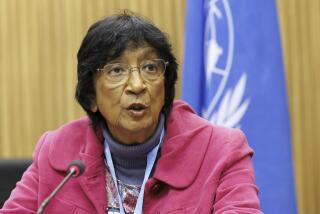Hate Crimes Increase Since Start of War : Prejudice: Record number of incidents has been directed against Arab-Americans, study says.
- Share via
WASHINGTON — The number of hate crimes directed at Arab-Americans has risen to a record high since the war in the Persian Gulf began last month, according to a report released Wednesday by the American-Arab Anti-Discrimination Committee.
Since Operation Desert Storm began, a total of 48 acts of violence, harassment or intimidation against Arab-Americans nationally have been reported to the ADC. They account for more than half of the 95 incidents logged since Iraq invaded Kuwait Aug. 2, it said.
For the month of January, 58 such hate crimes have been reported throughout the United States, nine of them in California. That compares with only one case of harassment in the United States in January, 1990.
Two of the 1990 incidents occurred in Orange County, where about 70,000 Arab-Americans live. According to the report, on Aug. 14 “a prominent Arab-American walked a visitor to his car about midnight and found a Star of David spray-painted on the car.” And on Aug. 22, a woman called an Arab-American gas station manager and “said she would burn down his place.”
About 70% of all incidents nationally have involved threats or intimidation. Vandalism and destruction have accounted for about 16% of the crimes, while actual physical assaults have made up about 14%, the ADC reported.
The recent tally is by far the highest since the organization began compiling hate crime statistics in 1985 after ADC Regional Director Alex Odeh was killed by a bomb in his Santa Ana office during the Achille Lauro hijacking.
“Since that time we have seen ups and downs,” said ADC President Albert Mokhiber. “Any time there is a crisis in the Middle East, there’s a backlash against the Arab-American community.”
In Newport Beach two weeks ago, a Lebanese restaurant received a bomb threat, and a police spokesman there said officers are closely monitoring both Arab and Jewish businesses in the city.
Dr. George Dibs, president of Orange County’s Arab-American Republican Club in Orange County, said Wednesday that he was not aware of the ADC report or the incidents it mentioned.
“I have heard of no acts of vandalism or attacks on persons, but I have heard of a good deal of harassment of children of Arab-Americans in schools--taunting by some of their classmates,” Dibs said.
Mokhiber said there was a brief respite from Arab discrimination during the intifada uprising by Palestinians in the Israeli-occupied West Bank and Gaza strip. “For the first time, Arabs were being viewed as the victims rather than terrorists or aggressors,” he said. “This is the stereotype we have been trying to eliminate for the last couple of years.”
But the crisis sparked by Iraqi President Saddam Hussein’s invasion of Kuwait six months ago has caused a sharp rise in the level of public hostility toward Arabs and Arab-Americans, the organization said.
Following the deployment of U.S. troops to the Persian Gulf region, anti-Arab violence and crime increased significantly--from five incidents of anti-Arab hate crimes from January through July, 1990, to more than 40 reports from August through December.
The report did not break down statistics by Arab-American subgroups. A handful of incidents described in the report identified the targets as Iraqis, Kuwaitis or Palestinians, but most simply described the victims as Arab-Americans.
“But not all Arabs are under attack,” Mokhiber noted. “This is a relatively small number given the entire number of Arab-Americans in the U.S.”
There are about 2 million Americans of Arab descent in the United States. Although most Arab-Americans live in the Northeast region, California has the single largest Arab-American community: about 350,000 people, or almost 1% of the state’s population.
ADC officials also criticized recent FBI questioning of Arab-Americans, particularly an interview on Monday of an Arab-American government employee who was asked about attitudes of his ethnic group toward the war.
“The FBI is engaging in interviews of Arab-Americans under the assumption that we have some special knowledge of terrorism, which is baseless,” Mokhiber said. “Obviously, like other Americans, we would bring forward such information if we had it.”
Times staff writer Lanie Jones contributed to this report.
More to Read
Sign up for Essential California
The most important California stories and recommendations in your inbox every morning.
You may occasionally receive promotional content from the Los Angeles Times.










